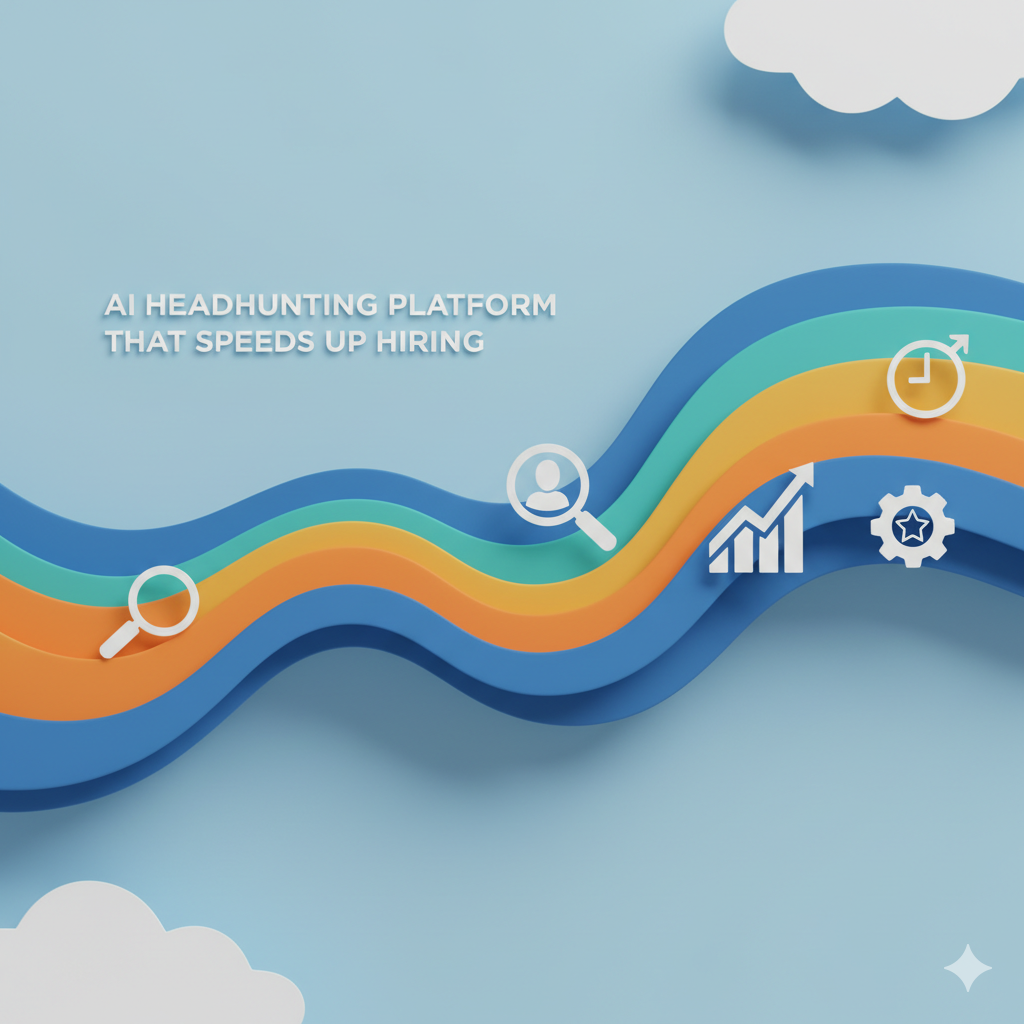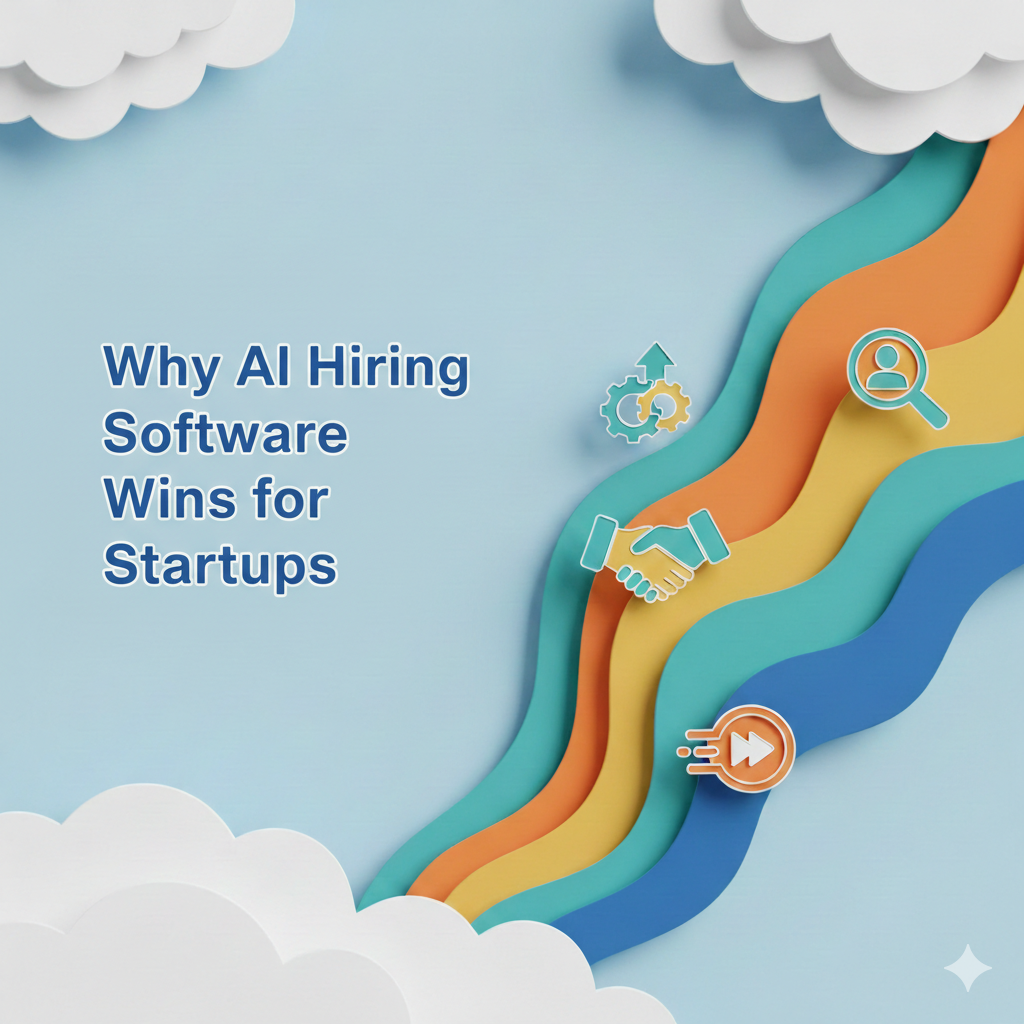AI for Recruiters: Enhancing Hiring Efficiency and Accuracy

Have you ever wished hiring could be quicker, fairer, and less stressful?
That’s precisely where AI for recruiters makes a difference. By automating routine tasks like screening, scoring, and scheduling, AI lets you focus on what truly matters: choosing the right people for your team.
With AI, you cut delays, reduce bias, and keep candidates engaged throughout the process. Tools like HRMLESS use conversational AI interviews that work 24/7, so applicants can complete interviews independently. This approach cuts hiring time dramatically while lowering no-shows through automated SMS and email nudges.
Your hiring process scales smoothly without extra stress. AI filters out unqualified applicants, surfaces top talent, and saves you hours per hire, all while creating a better candidate experience.
In this blog, you will learn:
- How AI automates key steps in recruitment to save time
- The technologies behind AI tools that recruiters rely on
- Practical ways AI improves accuracy, fairness, and candidate engagement
With the right AI tools, recruiters can finally spend less time on admin and more time making smarter hiring decisions.
Understanding AI for Recruiters
AI is changing how you find, screen, and communicate with candidates. It uses innovative technology to speed up tasks, improve decision-making, and keep candidates engaged. You’ll learn about what AI means in recruiting, the tools behind it, and both its advantages and limits.
What Is AI in Recruitment?
AI in recruitment means using computer systems to handle hiring tasks that humans usually do. It works by learning from data and patterns to make better choices faster. For example, AI can sort through resumes to find candidates who match your job descriptions. It can also schedule interviews without back-and-forth emails.
This helps reduce time wasted on unqualified candidates and speeds up hiring. Your hiring team can focus on talking to the right people instead of managing paperwork.
Key Technologies Used
AI recruiting relies on a few main technologies:
- Machine Learning (ML): AI learns from past data to predict the best candidates.
- Natural Language Processing (NLP): Helps AI read and understand resumes, cover letters, and video interviews.
- Chatbots: Engage candidates right away by answering questions and scheduling interviews.
- Automation: Handles repetitive tasks like sending reminders or follow-ups.
Platforms like ours combine these technologies to automate screening, scoring, scheduling, and candidate engagement all in one place.
Benefits and Challenges
AI brings clear benefits to your recruitment:
- Save Time: Automated tasks cut hours from your hiring process.
- Better Quality: AI finds candidates who fit your needs with more accuracy.
- Reduce Bias: AI can help remove human prejudices by focusing on skills and data.
- Keep Candidates Engaged: Automated messaging lowers no-shows and ghosting.
However, some challenges remain. AI depends on good data; poor input can lead to wrong decisions. It can also miss soft skills that humans learn. You need to stay aware of privacy and compliance rules when using AI tools.
Implementing AI in the Recruitment Process
AI can handle multiple steps in recruitment, making your hiring faster and more efficient. You can find candidates quickly, review resumes without bias, and set up interviews with less hassle. This saves time and helps you focus on the best applicants.
Sourcing Candidates With AI
AI tools scan job boards, social media, and databases to find candidates who match your job requirements. They look at skills, experience, and cultural fit based on keywords and patterns. This means you get a targeted list of potential hires faster than manual searches. You don’t have to browse hundreds of profiles.
AI narrows down the list to those most likely to succeed. Tools like ours can also use natural language processing to understand subtle skills and traits that matter but might be overlooked. Using AI for sourcing helps increase the quality and diversity of candidates while reducing the time recruiters spend searching.
Automating Resume Screening
Manual resume screening takes hours and can miss important details or show bias. AI removes these problems by quickly scanning resumes against your criteria. It uses algorithms to rank candidates based on their qualifications and experience. With AI, only the top-ranked resumes reach your desk.
This reduces the risk of hiring mistakes and keeps the process fair. Our tool scores and filters applicants automatically, helping you focus on those who best suit your needs. Automation frees you from tedious reviewing and helps maintain consistent standards. It also speeds up hiring by moving qualified candidates forward without delay.
AI-Powered Interview Scheduling
Scheduling interviews often causes delays and confusion, with back-and-forth emails that waste time. AI scheduling tools automate this step by syncing calendars and sending candidates available appointment slots instantly.
This improves candidate experience by letting them pick times that work for them, reducing no-shows and late cancellations. An automated system can also send reminders via SMS or email, keeping candidates engaged.
By reducing administrative work, you can focus on interviewing and making decisions. Platforms like ours integrate scheduling with screening and scoring, creating a smooth hiring workflow without extra effort.
Improving Candidate Experience Through AI
AI helps make recruitment faster and smoother for candidates. It allows you to deliver clear, timely updates and support without extra effort, improving candidates' feelings about your process and keeping them engaged.
Personalized Communication
With AI, you can send messages tailored to each candidate's status and preferences. Instead of generic emails, candidates receive updates that fit their timeline, background, and application stage. This personal touch reduces confusion and keeps candidates informed regularly. You can automate follow-ups and reminders using AI tools.
For example:
- Send interview invites only to selected candidates
- Notify candidates instantly about status changes
- Provide feedback at key steps
Using personalized communication helps lower candidate drop-off rates. It also cuts down on your manual messaging and saves you time.
AI Chatbots for Candidate Support
AI chatbots provide 24/7 help for candidates, answering common questions about the job, process, or schedule. This instant support removes delays caused by waiting for human replies.
Chatbots can guide candidates through application steps, screening, and pre-interview prep. They deliver a consistent experience and reduce candidate frustration from unclear instructions or slow responses.
Benefits of AI chatbots include:
- Immediate replies to FAQs
- Help with scheduling or rescheduling interviews
- Support in multiple languages, if needed
By integrating chatbots, you create a seamless, helpful interaction that keeps candidates confident and informed. This reduces ghosting and no-shows because candidates have guidance whenever they need it. Using intelligent chatbots alongside your ATS improves both candidate satisfaction and hiring efficiency.
Enhancing Decision Making With AI Tools
AI tools give you precise data and help reduce unfairness in hiring. They handle repetitive tasks and analyze candidates with more accuracy. This lets you focus on choosing the best people based on facts, not guesses.
Data-Driven Candidate Assessment
AI uses data to rank candidates quickly and fairly. It scans resumes, compares skills, and scores applicants based on how well they fit your job needs. This means you spend less time sorting through piles of resumes. Tools like HRMLESS use AI to automate pre-screening and score candidates instantly.
You get a list of top applicants who meet your criteria. This speeds up hiring and improves candidate quality. You can also track patterns like time-to-hire and response rates through real-time dashboards. These numbers show where you can improve your process.
Bias Reduction in Hiring
AI can help cut down hidden biases in recruitment. It focuses on facts such as skills, experience, and qualifications instead of personal details like age, gender, or race. Our tool and other platforms remove identifying info during early screening. This ensures fair treatment for all applicants.
AI also flags inconsistent evaluation methods before bias can affect results. While AI supports fairness, human oversight matters. You still decide who fits your team culture and values. But with AI’s help, you reduce guesswork and make more objective, fair hiring choices.
Best Practices for AI Adoption by Recruiters
Adopting AI tools means making careful choices and managing change well. You must pick solutions that fit your needs and prepare your team to use them effectively. This approach helps you avoid common pitfalls and get the most from AI in hiring.
Evaluating AI Solutions
Start by defining what problems you want AI to solve, like reducing hiring time or improving candidate quality. Look for tools with clear benefits such as automated screening, scheduling, and candidate engagement. To avoid disrupting workflows, check if the AI integrates easily with your existing ATS or HRIS. Test the solution with real data or a pilot program before full rollout.
In AI decisions, consider factors like ease of use, accuracy, and transparency. Make sure the system provides insights through simple dashboards so you can track performance and spot bottlenecks. Choose AI that treats hiring as a partnership between automation and your judgment, not a replacement. Tools like ours offer features that support you while reducing routine tasks.
Change Management Strategies
Introduce AI gradually and prepare your recruiting team for new workflows. Communicate clearly about how AI tools work and the benefits they bring—faster hiring, less bias, and better candidate experiences. Train your team to use AI outputs as a guide, not a final decision, to keep human insight in the loop. Create feedback loops where recruiters share challenges and successes with AI.
Adjust processes based on this input to increase adoption and effectiveness. Also, address concerns about AI ethics early by setting clear guidelines for responsible use. Support change with leadership endorsement and resources. When your organization supports AI adoption, it becomes easier to kill the chaos and automate hiring smoothly.
Measuring the Impact of AI on Recruitment
You need precise data to see if AI tools in hiring improve your results. Standard metrics help track performance while ongoing tweaks ensure your system improves over time.
Key Performance Indicators
Focus on measurable results that show how AI changes your recruiting. Important indicators include:
- Time to Hire: How much faster do you fill roles?
- Candidate Quality: Are you getting better candidates who match the job?
- Screening Accuracy: How well does AI filter out unqualified applicants?
- Offer Acceptance Rate: Are more candidates accepting your job offers?
- No-Show Rate: Does scheduling automation reduce no-shows?
Using a dashboard with these metrics helps you see where AI adds value. Tools like ours provide real-time analytics so you can watch these numbers daily or weekly. Tracking quality and speed together ensures you don’t sacrifice one for the other.
Continuous Improvement
AI in recruitment isn’t a set-it-and-forget-it tool. You must review results regularly and adjust your approach. Try A/B testing by running parallel processes, one with AI steps and one without. This helps identify what works best.
Monitor candidate feedback for any issues in the experience. Use data to refine your AI settings.
For example:
- Adjust screening criteria if good candidates are missed.
- Change messaging frequency if candidates stop responding.
- Optimize scheduling to reduce no-shows further.
Our tool supports ongoing tuning with its flexible platform and detailed reports. By learning from every hiring cycle, you keep improving speed, quality, and engagement without extra work.
Future Trends in AI for Recruitment
AI will shape recruitment by making your hiring faster and more efficient. Expect more innovative sourcing that finds the best candidates using data-driven insights. This means less manual searching and more quality matches. Automation will handle repetitive tasks.
AI systems will screen resumes, score candidates, and schedule interviews automatically. This frees you to focus on building relationships and strategy. Personalization will grow. AI will tailor candidate experiences, offering hyper-personalized communication through SMS and email.
This keeps candidates engaged and reduces no-shows by up to 50%. AI will also improve fairness by reducing bias. Tools like ours use no-bias recruitment software to ensure only skills and fit matter. This helps create a more diverse and qualified talent pool.
You will see 24/7 AI interviews allowing candidates to complete assessments anytime. This speeds up hiring and fits different time zones or schedules.
Here’s what you get with platforms like HRMLESS:
- Automated pre-screening interviews on your time
- AI-driven candidate scoring and filtering
- SMS & email nudges to keep talent engaged
- Smooth ATS integration for easy workflow
- Real-time analytics to spot bottlenecks and improve process speed
By adopting these trends, your hiring process becomes faster, fairer, and less stressful. AI doesn’t replace you; it frees you to make better decisions.
Ethical Considerations in AI-Driven Hiring
Fairness is crucial when using AI in hiring. AI systems learn from past data, which may include human biases. Unchecked, this can lead to unfair treatment of candidates based on gender, race, or age. To avoid this, your AI tools must be transparent.
You should know how decisions are made and ensure candidates have a fair chance. Transparent processes help build trust with applicants. Privacy is another key concern. Your system must protect candidate information. Data should be stored securely and used only for hiring purposes. Using AI doesn't mean removing humans from the loop.
Combining AI-driven screening with human oversight keeps hiring fair and accurate. Our tool offers this balance by automating repetitive tasks while letting you make the final decisions.
Here are some core ethics to consider when adopting AI hiring software:
Ethical Focus
What It Means for You
Bias & Fairness
Ensure AI does not repeat past hiring faults
Transparency
Understand how AI scores and filters candidates
Privacy
Protect personal data through secure handling
Human Oversight
Review AI decisions to confirm fairness
You can automate pre-screening, scoring, and scheduling without losing control over fairness and privacy.
Wrapping It Up
Artificial intelligence is no longer just a buzzword; it’s a practical tool transforming how recruiters work daily. By automating time-consuming tasks like screening, scheduling, and candidate engagement, AI allows you to focus on meaningful conversations and smarter hiring decisions. Platforms like HRMLESS, powered by Nerva AI, ensure your process runs smoothly, reduces ghosting, and keeps candidates connected from application to offer.
Recruitment should be efficient, fair, and stress-free, and with AI, it finally can. It’s about building better teams faster while giving candidates a positive experience they’ll remember.
Kill the chaos. Automate hiring with conversational AI interviews. Start your free trial or book a demo with HRMLESS today.
Frequently Asked Questions
AI in recruitment sounds exciting, but you may still have questions about how it works in practice. Let’s clear up some common doubts with straightforward answers that help you see the bigger picture.
How does AI help recruiters handle large volumes of applications?
AI tools scan resumes at scale, filter out unqualified profiles, and prioritize top candidates instantly. Instead of spending hours reviewing, recruiters get a shortlist within minutes, helping them manage hundreds of applications efficiently without sacrificing quality.
Can AI tools support remote and global hiring needs?
Yes. AI platforms operate 24/7 and can screen, score, and schedule interviews across time zones. This flexibility helps companies build global teams quickly, ensuring candidates worldwide can complete assessments and interviews conveniently.
Does AI replace human recruiters in the hiring process?
No, AI supports rather than replaces recruiters. It handles repetitive tasks like scheduling or resume screening, but final hiring decisions and cultural fit assessments still depend on human judgment. Think of AI as a partner, not a replacement.
How can recruiters ensure AI is being used responsibly?
Recruiters should regularly audit AI outputs for fairness, check candidate feedback, and stay aligned with privacy laws. Responsible AI use means combining automation with human oversight to keep hiring efficient, transparent, and ethical.
What role will AI play in the future of recruitment?
AI will move beyond automation into personalization, offering tailored candidate experiences, deeper predictive insights, and human-like conversational interviews. Recruiters will rely on AI more for efficiency while focusing their energy on strategic and people-centric work.
Featured
Subscribe to ournewsletter
Related posts
Explore the world of photography with our curated selection of
portfolio websites that showcase creativity and innovation.




